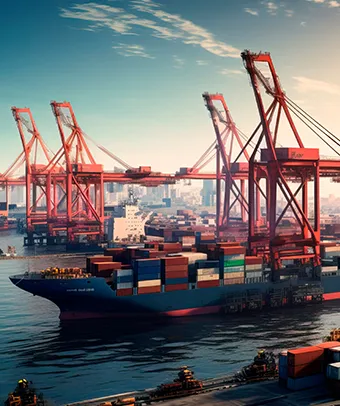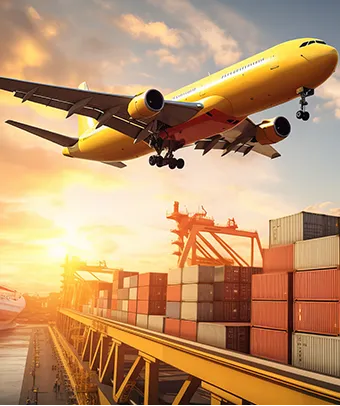
Operation of
In import operations, we have a comprehensive structure and know-how, offering customized strategies focused on cost reduction and efficiency in each process. We manage all stages, from feasibility studies to delivering the imported product directly to the contractor's business.
Our import services include:
Operation of
In export operations, our services include planning, structuring operations, and coordinating logistics processes, with comprehensive consulting that includes pricing analysis, competitive credit line studies, and connecting with global partners to add value to market formation in the medium and long term.
Our export services include:

Our Differentiators in services
Complete logistics — Aims to deliver the product cleared and legalized, directly to the importer's door. The "Door-to-Door" policy is applied to imports of all sizes, whether for businesses or individuals.
Personalized advice — Exclusively designed to serve small and medium-sized businesses — that wish to start selling abroad and/or import products and raw materials — the consulting provided by BBA Comex is comprehensive and includes a study of the target market, sourcing foreign suppliers, a quick quotation system, shipment of samples, and studies on the requirements and tariff and bureaucratic barriers of the country of interest, as well as import cost estimates and a technical opinion in the initial stage of the process.
Two units — With two service units, we are present in important port cities, with headquarters located in Alagoas and a branch in Rio de Janeiro, providing even more agility to import and export processes. Additionally, we maintain operational agents in the main customs centers in the country.
Know-How — Our executive team has extensive experience, with consistent import volumes and regular shipments to the company's flexible packaging division, thereby reducing import shipping fees through consolidation.
Express orders — Specially developed for emergency imports — such as spare parts and urgent orders, this service is facilitated by partnerships established with trade companies in other strategic countries, especially China and other Asian countries, expediting the purchase and shipment of the product in any quantities, ideal for emergency replenishment cases.

Where
We operate in key points across Brazil and at major customs stations, including:
Questions
Siscomex is an computerized tool through which the Brazilian government exercises control over foreign trade.
Purpose: To connect the main system users: exporters, importers, the Federal Revenue Service of Brazil (Ministry of Finance), the Secretariat of Foreign Trade (Ministry of Industry, Trade, and Tourism), the Central Bank of Brazil, Banco do Brasil S.A., banks authorized to conduct foreign exchange transactions, legal representatives of exporting and importing companies, transportation companies, and other secretariats and departments from different ministries directly related to various aspects of Brazilian foreign trade.
Records issued by Siscomex:
Import:
1 – L.I. Import license
2. L.I. Statement
3. D.I. Import Declaration
4. D.I. Statement
5. C.I. Import Certificate
6. R.O.F. Financial Operation Record
Export:
1. R.E. Export Registration
2. R.V. Sales Registration
3. R.O.C. Credit Operation Record
4. S.D. Dispatch Request
5. C.E. Export Certificate
FCL stands for "Full Container Load"
In this mode, the exporter fills the container with their cargo without the need for a second exporter to help complete the container load. Our company offers this service with the best rates on the market for international freight contracts, both for import and export.
LCL stands for "Less Container Load"
This mode indicates that the exporter does not have enough cargo to fill an entire container and therefore will ship their cargo alongside other exporters, with each being responsible for their own cargo. The exporter delivers the cargo to the specified terminal, and the freight agent is responsible for stuffing the container and transporting it to the ship's docking area. Upon arrival at the destination, each importer will be responsible for deconsolidating their cargo.
Federal Revenue Service Instruction No. 225, dated October 18, 2002, establishes requirements and conditions for the performance of corporate importers in operations conducted on behalf of third parties.
The BBC Comex acts as a service provider, using the buyer's funds to pay for expenses, taxes, foreign exchange settlements, and other operational risks. The business agreement is invariably made between the buyer and the exporter. According to Federal Revenue Service regulations, this mode is characterized by the following conditions:
Federal Revenue Service Instruction No. 634, dated March 24, 2006, establishes requirements and conditions for the performance of importing legal entities in operations carried out for resale to a predetermined purchaser, or in other words: in this mode, there is a predetermined buyer of the goods, who agrees with the foreign supplier (exporter) on the values and logistics of the business. The trading company acts as the importer of the goods, and after processing the goods through customs and paying the respective taxes, resells them to this single predetermined buyer. According to Federal Revenue Service regulations, this modality is characterized by the following conditions, as per IN 634/06:
SWIFT stands for “Society for Worldwide Interbank Financial Telecommunication.”
It is a cooperative through which the global financial world conducts business operations with speed and trustworthiness. Over 8,300 banking organizations and corporate clients in more than 208 countries demonstrate their trust in the system daily, exchanging millions of standardized financial messages.
SWIFT offers its clients the ability to automate and standardize their financial transactions, resulting in cost reduction, decreased operational risks, and the elimination of inefficiencies. With SWIFT, clients can also create business opportunities and new trade flows.
The entity is headquartered in Belgium and has offices in major financial centers around the world, as well as in developing countries.
Click on the unit and check the information.